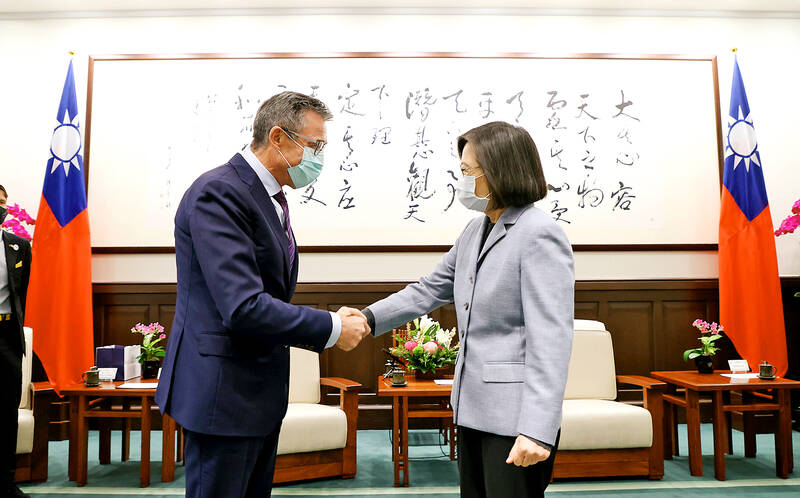Former NATO secretary-general Anders Fogh Rasmussen yesterday said that his visit to Taiwan was a show of “strong support” for the nation’s self-determination, freedom and democracy.
Speaking during a meeting with President Tsai Ing-wen (蔡英文) at the Presidential Office in Taipei, Rasmussen said he was “in Taiwan to show my strong support for your rights to decide the future of Taiwan yourselves.”
“I am here to show my strong support for your rights to exist in freedom and peace,” he added.

Photo: CNA
Rasmussen was speaking in his capacity as the founder of the Alliance of Democracies Foundation, a Denmark-based organization seeking to advance democracy and free markets worldwide.
The foundation, which invited Tsai to address its annual democracy summit for three consecutive years from 2020, was sanctioned by Beijing in 2021.
The former Danish prime minister, who was secretary-general of NATO from 2009 to 2014, arrived in Taiwan on Tuesday for a three-day trip that is to conclude today.
The world’s democracies represent 60 percent of the global economy and if they work together, they could be “a formidable force that will create respect in Beijing and other capitals of autocratic nations,” he said. “We need to strengthen our fight against — or our attempts to counter — the advancing autocracies.”
“Taiwan is a solid democracy belonging to the family of the world’s democracies,” he said, adding that he looked forward to discussing with Tsai how to “further strengthen the bonds between Taiwan and Europe.”
Tsai said that Taiwan would continue to boost its national defense in response to the challenges posed by authoritarian expansionism, while seeking to increase cooperation with democratic allies to contribute to peace and stability in the Indo-Pacific region.
The government’s plans to extend compulsory military service to one year from four months and roll out reforms to intensify military training were part of efforts to bolster the nation’s defense capability, she said.
Since Rasmussen last visited Taiwan in 1994, the nation has transformed into a vibrant democracy with a prosperous economy and resilient civil society, Tsai said.
Her administration is happy to see Rasmussen bear witness to the long strides the nation has made, and the deep faith Taiwanese have in freedom and democratic values, she said.
Taiwan is one of many successful democracies with an authoritarian past and therefore appreciates its hard-won freedoms as something that should not be taken for granted, she added.
Additional reporting by Chen Yun

PREPAREDNESS: Given the difficulty of importing ammunition during wartime, the Ministry of National Defense said it would prioritize ‘coproduction’ partnerships A newly formed unit of the Marine Corps tasked with land-based security operations has recently replaced its aging, domestically produced rifles with more advanced, US-made M4A1 rifles, a source said yesterday. The unnamed source familiar with the matter said the First Security Battalion of the Marine Corps’ Air Defense and Base Guard Group has replaced its older T65K2 rifles, which have been in service since the late 1980s, with the newly received M4A1s. The source did not say exactly when the upgrade took place or how many M4A1s were issued to the battalion. The confirmation came after Chinese-language media reported

A Ministry of Foreign Affairs official yesterday said that a delegation that visited China for an APEC meeting did not receive any kind of treatment that downgraded Taiwan’s sovereignty. Department of International Organizations Director-General Jonathan Sun (孫儉元) said that he and a group of ministry officials visited Shenzhen, China, to attend the APEC Informal Senior Officials’ Meeting last month. The trip went “smoothly and safely” for all Taiwanese delegates, as the Chinese side arranged the trip in accordance with long-standing practices, Sun said at the ministry’s weekly briefing. The Taiwanese group did not encounter any political suppression, he said. Sun made the remarks when

The Taiwanese passport ranked 33rd in a global listing of passports by convenience this month, rising three places from last month’s ranking, but matching its position in January last year. The Henley Passport Index, an international ranking of passports by the number of designations its holder can travel to without a visa, showed that the Taiwan passport enables holders to travel to 139 countries and territories without a visa. Singapore’s passport was ranked the most powerful with visa-free access to 192 destinations out of 227, according to the index published on Tuesday by UK-based migration investment consultancy firm Henley and Partners. Japan’s and

BROAD AGREEMENT: The two are nearing a trade deal to reduce Taiwan’s tariff to 15% and a commitment for TSMC to build five more fabs, a ‘New York Times’ report said Taiwan and the US have reached a broad consensus on a trade deal, the Executive Yuan’s Office of Trade Negotiations said yesterday, after a report said that Washington is set to reduce Taiwan’s tariff rate to 15 percent. The New York Times on Monday reported that the two nations are nearing a trade deal to reduce Taiwan’s tariff rate to 15 percent and commit Taiwan Semiconductor Manufacturing Co (TSMC, 台積電) to building at least five more facilities in the US. “The agreement, which has been under negotiation for months, is being legally scrubbed and could be announced this month,” the paper said,